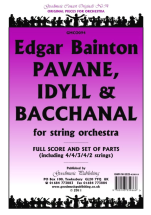Pavan, Idyll & Bacchanal
Buy this item (out of stock)
Product ID: GM2 CO094
By Edgar Bainton
Publisher:
Goodmusic
Arranger:
Strings (Violin 1, Violin 2, Viola, Cello, Bass)Flute (or solo violin) Idyll onlyTambourine (optional) Bacchanal only
Series:
Goodmusic Concert Originals
Line Up:
String Orchestra (Solo: Flute)
Duration:
10:00
Level: 4
Set & Score
This item is out of stock
About this item
The PAVANE,
IDYLL and BACCHANAL was written in 1924. This was Bainton’s only
published orchestral work (he is known chiefly for his choral music) and
was originally published in 1925 by Oxford University Press. This new
edition has been re-typeset but is otherwise unchanged.
The flute only plays in the Idyll, though this may be played by a solo violin. The tambourine in the Bacchanal may be omitted.
A
recording of this work with Paul Daniel conducting the BBC Philharmonic
Orchestra is available on the Chandos label (CHAN10460).
Songlist (3)
- Pavan
- Idyll
- Bacchanal
Instrumentation
Strings (Violin 1, Violin 2, Viola, Cello, Bass)
Flute (or solo violin) Idyll only
Tambourine (optional) Bacchanal only
Reviews and rating
No review available, be the first to write one!

Composer
Edgar Bainton
Edgar Leslie Bainton was a pupil of Walford Davies and Stanford, friend of George Dyson and long-time Principal of Newcastle-upon-Tyne Conservatory. He emigrated to Australia in 1934, and thus sadly faded from the British music scene. In 1914 while en route to the Bayreuth Festival, Bainton was apprehended as a British civilian in wartime Germany and interned for the next four years in Ruhleben Camp near Berlin. He was placed in charge of music-making at the camp and became acquainted with a number of other musicians, including Ernest MacMillan and cellist Carl Fuchs. Despite many hardships this four-year exile proved to be a period of great creativity, resulting in his Three Pieces for Orchestra and a piano concerto.
More info about the composer...



 Click above to view samples
Click above to view samples
